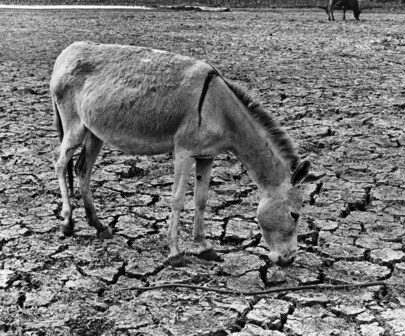
While on the diplomatic agenda for at least 15 years, desertification has been largely relegated to the periphery even as such affects 2 billion people directly and all of us indirectly. A UN meeting now highlights the need for stronger action to protect the world’s drylands, which are home to two billion people, stressing that doing so will help reduce poverty and improve development prospects. More than 12 million hectares of productive land are lost due to desertification every year, the equivalent of losing an area the size of South Africa every decade, according to the Secretariat of the UN Convention to Combat Desertification (UNCCD). While the term desertification often conjures up visions of land turning into barren tracts of sand, it actually refers to a less dramatic but equally destructive process – the loss of the capacity to grow crops or raise livestock in arid, semi-arid or dry sub-humid areas, the so-called drylands.
Drought Does Not Have to Equal Famine?
While productive land becomes scarcer, providing food for the nine billion people predicted to live on Earth in 2050 will require a 70 per cent increase in global food production. “Drought and land degradation must therefore move to the centre of policy development,” Secretary-General Ban Ki-moon told the meeting, one of several high-level events taking place this week on the margins of the 66th session of the General Assembly. “By refocusing our development agenda to include the potential of drylands, we can break the links between poverty and desertification, drought and land degradation,” he said.
Mr. Ban drew attention to the drylands of the Horn of Africa, which are experiencing the most severe food crisis in the world, leaving more than 13 million people in Djibouti, Ethiopia, Kenya and Somalia in urgent need of humanitarian aid.
“Drought does not have to become famine. Too often the international community reacts too late. Too often decisions are taken based on false economies. In the end, we count the cost not just in human lives but in the extra expense of responding to crises that could have been averted for a fraction of the price. The world’s drylands are too often an investment desert – seen by governments and the international community as a lost cause. Nothing could be further from the truth,” he added, noting that drylands hold the potential to drive national economic growth and sustainable human development.
Part of Broader Global Climate Change, Poverty Eradication, Food Security Considerations:
The President of the General Assembly, Nassir Abdulaziz Al-Nasser, said that desertification is one of the most complex challenges today, with serious environmental, economic, political and social impacts that affect people, most of whom are poor. He highlighted the need for major innovative policy interventions and shifts in sustainable land management strategies to address the impacts of desertification, which must be done with the active engagement of all stakeholders and local communities. “Effectively addressing desertification and land degradation can only be done in the context of other major global challenges, such as climate change, poverty eradication, food security, deforestation and biodiversity loss,” the President added.
Established in 1994, UNCCD is the sole legally binding international agreement linking environment, development and the promotion of healthy soils. The convention’s 194 parties work to alleviate poverty in the drylands, maintain and restore the land’s productivity and mitigate the effects of drought.
“Mainstreaming in National Strategic Plans”:
UNCCD Executive Secretary Luc Gnacadja told the meeting that this is the first time that the convention’s core issues are being taken up by such a high-level political gathering since its entry into force in 1996.
“Among the main challenges in implementing the convention, low political recognition and lack of mainstreaming in national strategic plans come first,” he noted. “However, addressing land degradation is not a burden for public budgets, but rather a driving force for sustainable and inclusive economic development.” He said that “to sustain life on Earth, we must build a land degradation-neutral world,” which will involve a global commitment leading to effective action at all levels. “I urge you as the leaders of our planet to take policy measures which will lead to a paradigm shift in the way we manage our land resources.”
Mr. Gnacadja noted that many people used to believe that land degradation and desertification were problems that only affected a few people in some remote places, but that has changed thanks in part to the convention. “Land degradation is happening everywhere in the world,” he stated, stressing that attention at the highest political levels must be given to this issue.
Related FILM REPORT – “Man Who Stopped Desert” -
diplomaticallyincorrect.org/films/movie/man-who-stoped-desertun-related-film/26281
Related FILM REPORT – “Desertification Brazil/Man & Nature” -
diplomaticallyincorrect.org/films/movie/desertification-brazil-mannature/25699
By Ambassador Muhamed Sacirbey
Face Become a Fan at “Diplomatically Incorrect”
Twitter – Follow us at DiplomaticallyX
ECOLOGY-DIPLOMAT Channel -
diplomaticallyincorrect.org/c/ecology-diplomat

